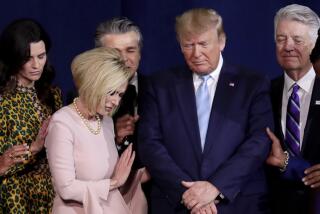Op-Ed: Will the political climate deprive ‘La La Land’ of the best picture Oscar?

Will issue-oriented movies trump eye candy at this year’s Oscars as Hollywood seeks to send a message that it won’t stand for fear-driven legislation meant to rob minorities of their rights?
Following that embarrassing #OscarsSoWhite campaign, the Academy of Motion Picture Arts and Sciences last year expanded its membership with a healthy infusion of younger, more diverse talent. And unlike the Academy’s Old Guard (white, male, over 50), these new members — Mahershala Ali (“Moonlight”), Carmen Ejogo (“Selma”), Idris Elba (“Beasts of No Nation”), Byung-Hun Lee (“The Magnificent Seven”), and America Ferrera (“End of Watch”), among them — may well prefer real-life issues over sentiment or institutionalized nostalgia. In the current volatile political climate, they won’t want to appear self-congratulatory or out of touch. They’ll want their votes to matter.
If the above scenario plays out, the presumptive best picture winner, “La La Land,” will be the biggest casualty, as Academy voters shunt aside the popular throwback musical starring Emma Stone and Ryan Gosling for something less frothy.
By attacking Streep, Trump may well have helped Streep to a record 20th Oscar nomination.
I’m ordinarily not a gambling man, but I’d take the long odds on “Moonlight” or “Fences” to win in the best picture category, with the edge going to Barry Jenkins’ “Moonlight” because the Miami-set drama tackles both racism and homophobia and “Fences,” as good as it is, is a more traditional stage-to-screen transfer.
What about “Hidden Figures” or “Lion” or “Manchester by the Sea,” all critically acclaimed best picture nominees? The first, about African American mathematicians standing up to NASA’s segregationist practices during the space race, is worthwhile if conventional; the second, about a lost boy finally finding his way home, is too baldly manipulative; the third, starring best actor front-runner Casey Affleck as a brooding New England handyman, is intense but mostly lily white.
“La La Land,” like “The Artist,” the best picture winner in 2012, is show biz honoring show biz and, therefore, more than a little narcissistic. Which is why it leads the pack with 14 nominations. But as things heat up politically — and each day brings a more alarming executive order — it will look more and more inconsequential. And this will spell its undoing in the top category. It should do fine in the production design, cinematography, song and score categories.
Another sign that “La La Land” is no longer a lock for best picture: Meryl Streep’s nomination in the best actress category for her portrayal of a tone-deaf philanthropist in the indifferently received “Florence Foster Jenkins.” This is the spot that was reserved for either Amy Adams in “Arrival” or Annette Bening in “20th Century Women.” My guess is that Streep edged out both actresses after her anti-Trump speech at the Golden Globes. Suddenly, the actress morphed into Delacroix’s barricade-storming “Liberty Leading the People.” The following morning, then-President-elect Trump lashed out via Twitter, calling her “a Hillary flunky” and “one of the most overrated actresses in Hollywood.”
By attacking Streep, Trump may well have helped Streep to a record 20th Oscar nomination. (Nomination voting closed five days after the Golden Globes.) The president’s subsequent attacks on everything the movie industry holds dear could have a similar call-to-arms effect, mobilizing Academy membership.
This year’s final Oscar vote (Feb. 13-21) will be a referendum of sorts on Trump. Too bad for “La La Land.”
Glenn Lovell is the author of “Escape Artist: The Life and Films of John Sturges.” He teaches film studies at De Anza College and other Bay Area universities.
Follow the Opinion section on Twitter @latimesopinion and Facebook
More to Read
A cure for the common opinion
Get thought-provoking perspectives with our weekly newsletter.
You may occasionally receive promotional content from the Los Angeles Times.






